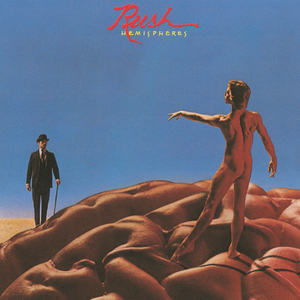Re Hemispheres:
This album continues the maturation of the band which began on Kings. Their songwriting just keeps improving and becoming more consistent. This is not as cohesive an album overall as A Farewell To Kings, and thus is not quite as great, in my view. The great moments on Kings are generally greater than the great moments on Hemispheres (though "Villa" rivals "Xanadu"), while Hemispheres is more consistently enjoyable throughout.
As I wrote earlier, "Cygnus X-1 Book II" is far more interesting than "Book I." That's my subjective opinion, but I think objectively "Book II" has much more of a focus on music, and less on atmospheric sound effects. The plot: after going through the black hole, the captain of the Rocinante (named after Don Quixote's horse, btw) finds himself on Mount Olympus, where Apollo and Dionysus are battling for the souls of man. Apollo believes mankind should be guided solely by logic and reason, and Dionysus believes it should be guided by desire and emotion. The captain convinces them that both are important elements of being human (left-brain vs. right-brain, hence, the two "hemispheres" of the brain). This is such a persuasive and surprising revelation to the gods that they make the captain a god as well. Rather than a soundtrack-type extended score, as others observed "Book I" was, it really should be considered a suite of about five or six shorter, related songs. (0:00) "Prelude" dispenses with the atmospheric sound effects after about three seconds and jumps right into the song, which is reminiscent of the 2112 "Overture" as it anticipates many of the musical themes throughout the longer suite, but then it transitions to its own stand-alone song. And, at around 1:58, it also foreshadows the harmonic beginning to "Red Barchetta." Nice melody, occasionally a "groovy" kind of rhythm, very guitar-heavy. If "Prelude" were simply a stand-alone song, it would not have been out of place on Permanent Waves. Solid classic Rush sound, and highly enjoyable, but not nearly as memorable as the overture to 2112. (4:30) "Apollo" slows things down a notch to start, some awkwardly sung lyrics, but then kicks into a heavier guitar-focused theme. Someone once wrote that music isn't just about the notes, it's about the spaces between the notes. Rush really figures this out here, as the most exciting parts of the song are the pauses before the descending chord progression. (7:00) "Dionysus" is very similar musically to "Apollo." Lyrically, it's the "right-brained" rebuttal to Apollo's "left-brained" argument that mankind should be guided by logic and reason rather than emotion and desire. (9:06) "Armageddon" is, understandably, the heaviest part of the song, though it features some fairly annoying vocals by Geddy. (12:00) This is the part where the captain tries to break up the war and argue for the compromise, and becomes a god named Cygnus. The song slows WAY down at the beginning, and starts to sound like Book I. Not coincidentally, I start to lose interest here. The vocal melody isn't bad, though. Things pick up again at about 14:35, and ultimately reaches the climax, and arguably the best part, of the entire suite. Very 2112-sounding. Awesome Lifeson solo here. (17:02) "The Sphere" is the quiet conclusion, in which the left brain and right brain become united in a sphere. Lovely song, and appropriately short.
Obviously, given the title of the album, "Book II" was intended to be the centerpiece of the album. But, side two is actually better -- a LOT better. "Circumstances" is a great hard rock track. Great, unconventional riffs, some changes in time signature. A lot going on in the span of a fairly short, under 4-minute song. I've read a fair amount of criticism of Geddy's high-pitched singing on this track, but I don't mind it. I like this song a lot. In fact, it has become one of my favorite Rush tracks. "The Trees" is an ingenious allegory (or, is it a parable?) criticizing the evils of ... what? I've read that it is anti-tyranny, anti-communism and anti-racism. It's probably all of those, and probably also shows that Ayn Rand was still a significant influence on Peart at that time. The song is a fan favorite and frequent concert staple.
"La Villa Strangiato" is, in my view, the apex of Rush's prog-rock achievement. Brutally hard to play, evidently it took them as long to record this one song as it took them to record entire albums in the past. Yet it is so damn brilliant that they have been compelled to play it live, which must have given them night terrors early on. This is the song that makes you realize that each member of the band is a world-class musician, as the playing is so technically precise. And, while this song is (as they subtitled it) "an exercise in self-indulgence," it is very musical and pleasing to the ear. They make the difficult seem effortless. People worship Peart, and as mind-blowing as his (and Lee's) playing on this track is, Alex Lifeson nearly steals the show here -- how this track did not elevate him to the status of "guitar god" alongside Clapton, etc., is beyond me. A true masterpiece. One of the greatest Rush tracks ever, and arguably the greatest rock instrumental ever.


 . But I won't anticipate.
. But I won't anticipate.